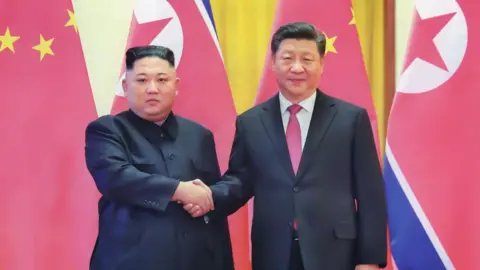North Korea's leader Kim Jong Un will attend a military parade in Beijing next week alongside Russia's Vladimir Putin, China has announced, marking a landmark visit for the North Korean leader.
This event, notable for being Kim’s first multilateral international meeting, signifies a diplomatic victory for China's Xi Jinping, who has been advocating for a new Beijing-led world order. It showcases Xi's limited but significant influence over both Putin and Kim during a time when the U.S. is engaging in negotiations with Russia regarding the ongoing war in Ukraine.
While U.S. President Donald Trump will not be in attendance, he expressed a desire earlier this week to meet Kim, whose expanding nuclear capabilities and backing for Russia pose challenges for Western nations.
The Victory Day parade will commemorate the 80th anniversary of Japan's surrender in World War II, and it will feature Kim and Putin among 26 global leaders expected to attend. It is significant as it will be the first time a North Korean leader has participated in a Chinese military parade since 1959.
China is expected to display its latest military technology, including hundreds of aircraft, tanks, and advanced defense systems, marking a first for its new force structure to be exhibited in such events. The highly coordinated ceremony will see tens of thousands of troops march through Tiananmen Square, alongside veterans, in a spectacle that will likely draw close attention from global analysts and Western powers alike.
In a recently held press briefing by China's foreign ministry, Beijing reaffirmed its traditional friendship with Pyongyang, highlighting ongoing cooperation towards maintaining regional peace and stability.
This upcoming parade will enhance Kim’s visibility on an international platform, all while bolstering his ties with China. Historically, he has aimed to balance relations between Beijing and Moscow but has not met with Xi for six years.
Additionally, the event comes ahead of a potential visit by Trump to Asia in the near future, amid rising tensions and the backdrop of a global pandemic. The upcoming military display represents a significant shift in the geopolitical landscape, particularly concerning U.S.-China relations.
While Western leaders largely boycott the parade, citing opposition to Russia’s actions in Ukraine, countries with growing ties to China, such as Indonesia and Malaysia, will be represented at the event.
As Kim’s last visit to Beijing for a similar commemorative ceremony was in 2019, this return to international diplomacy is being closely monitored for its implications on regional security and global power dynamics.


















